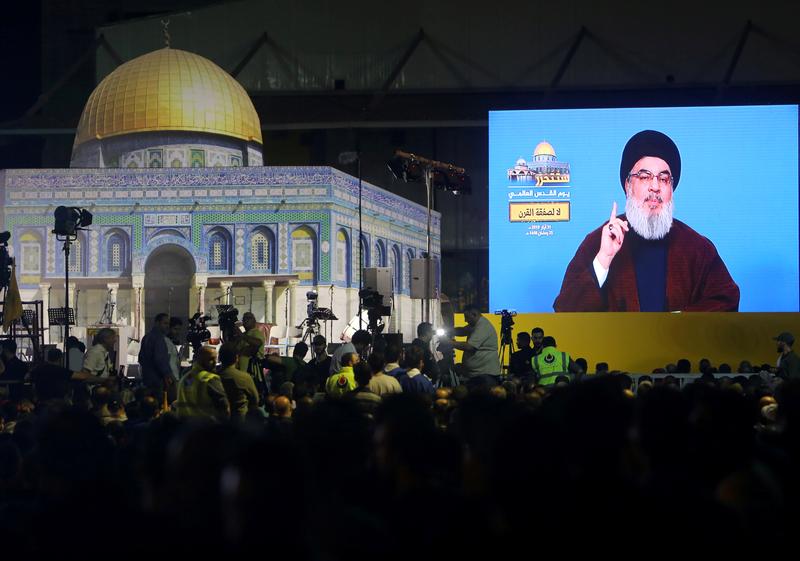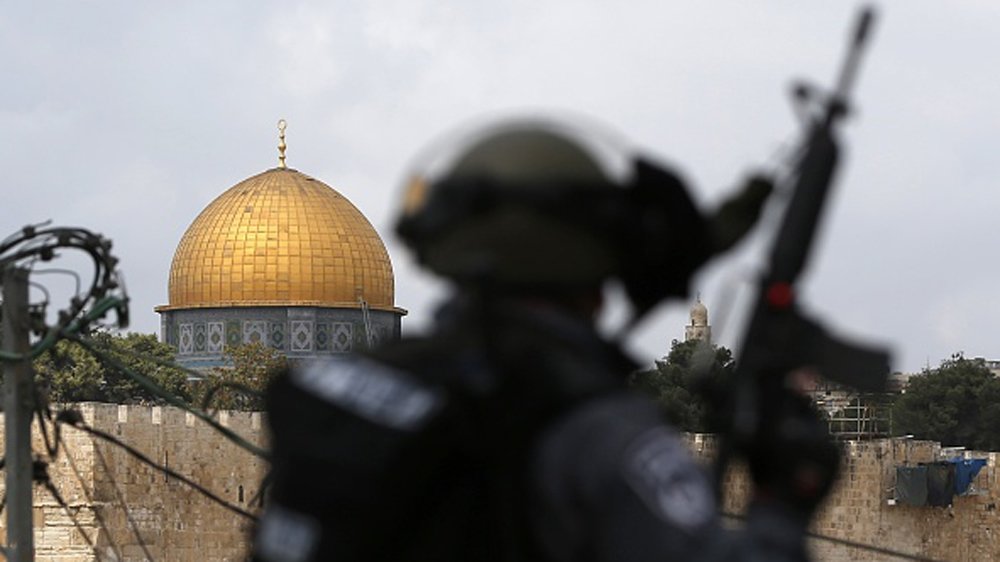Lebanon's Hezbollah vows to confront U.S. Middle East plan
June 1, 2019
BEIRUT (Reuters) - Lebanon’s Iran-backed Hezbollah pledged on Friday to confront the U.S. Middle East plan that President Donald Trump has touted as “the deal of the century.”
Sayyed Hassan Nasrallah, the leader of the heavily armed Shi’ite movement, said it was unlikely Washington and its allies would launch a war against Tehran as they would pay a heavy price.
The U.S. military has sent forces, including an aircraft carrier and B-52 bombers, to the region to counter what it called “clear indications” of threats from Iran.
The U.S. special envoy for Iran says the steps had deterred Tehran. But he said that Washington would respond to any attacks with military force, as Arab leaders met on Thursday to discuss what they deem a rising threat from Tehran.
Saudi Arabia’s king told an emergency Arab summit on Friday that decisive action was needed to stop Iranian “escalations” in the region after attacks on Gulf oil assets.
The United States knows that “war against Iran will not stop at Iran’s borders,” Nasrallah said in a televised speech at a rally marking the annual Quds (Jerusalem) Day. “The entire region will burn. ... All U.S. forces and interests in the region will be annihilated.”
He said the “balance of power” was preventing a U.S.-Iran war, which he warned would also hit U.S. allies Saudi Arabia and Israel.
Nasrallah described a U.S. blueprint to end the Israeli-Palestinian conflict, led by Trump’s son-in-law and senior adviser Jared Kushner, as a “historic crime” that must be stopped. “This is a religious, moral, humanitarian, jihadi duty,” he said.
The first stage of the plan, still in draft form after almost two years, is expected to be unveiled at a late June conference in Bahrain. It seeks to encourage investment in the West Bank and Gaza Strip by Arab donor states before grappling with thorny political issues at the heart of the conflict.
Palestinian and Arab sources briefed on the draft say it has jettisoned the two-state solution - the long-standing U.S. and world formula that envisages an independent Palestinian state alongside Israel in the West Bank, east Jerusalem and Gaza.
Nasrallah also denied charges that Hezbollah has factories in Lebanon to produce precision-guided missiles, but said it has enough of those missiles “to change the face of the region.”
Israel and the United States believe Hezbollah has sought home-grown production of precision-guided missiles that could paralyze Israeli infrastructure.
Israel sees Lebanon’s Hezbollah, against which it fought a month-long war in 2006, as the biggest threat on its borders.
Reporting by Ellen Francis; editing by Andrew Heavens and Leslie Adler

 www.reuters.com
www.reuters.com
June 1, 2019
BEIRUT (Reuters) - Lebanon’s Iran-backed Hezbollah pledged on Friday to confront the U.S. Middle East plan that President Donald Trump has touted as “the deal of the century.”
Sayyed Hassan Nasrallah, the leader of the heavily armed Shi’ite movement, said it was unlikely Washington and its allies would launch a war against Tehran as they would pay a heavy price.
The U.S. military has sent forces, including an aircraft carrier and B-52 bombers, to the region to counter what it called “clear indications” of threats from Iran.
The U.S. special envoy for Iran says the steps had deterred Tehran. But he said that Washington would respond to any attacks with military force, as Arab leaders met on Thursday to discuss what they deem a rising threat from Tehran.
Saudi Arabia’s king told an emergency Arab summit on Friday that decisive action was needed to stop Iranian “escalations” in the region after attacks on Gulf oil assets.
The United States knows that “war against Iran will not stop at Iran’s borders,” Nasrallah said in a televised speech at a rally marking the annual Quds (Jerusalem) Day. “The entire region will burn. ... All U.S. forces and interests in the region will be annihilated.”
He said the “balance of power” was preventing a U.S.-Iran war, which he warned would also hit U.S. allies Saudi Arabia and Israel.
Nasrallah described a U.S. blueprint to end the Israeli-Palestinian conflict, led by Trump’s son-in-law and senior adviser Jared Kushner, as a “historic crime” that must be stopped. “This is a religious, moral, humanitarian, jihadi duty,” he said.
The first stage of the plan, still in draft form after almost two years, is expected to be unveiled at a late June conference in Bahrain. It seeks to encourage investment in the West Bank and Gaza Strip by Arab donor states before grappling with thorny political issues at the heart of the conflict.
Palestinian and Arab sources briefed on the draft say it has jettisoned the two-state solution - the long-standing U.S. and world formula that envisages an independent Palestinian state alongside Israel in the West Bank, east Jerusalem and Gaza.
Nasrallah also denied charges that Hezbollah has factories in Lebanon to produce precision-guided missiles, but said it has enough of those missiles “to change the face of the region.”
Israel and the United States believe Hezbollah has sought home-grown production of precision-guided missiles that could paralyze Israeli infrastructure.
Israel sees Lebanon’s Hezbollah, against which it fought a month-long war in 2006, as the biggest threat on its borders.
Reporting by Ellen Francis; editing by Andrew Heavens and Leslie Adler
Lebanon's Hezbollah vows to confront U.S. Middle East plan
Lebanon's Iran-backed Hezbollah pledged on Friday to confront the U.S. Middle East plan that President Donald Trump has touted as "the deal of the century."









